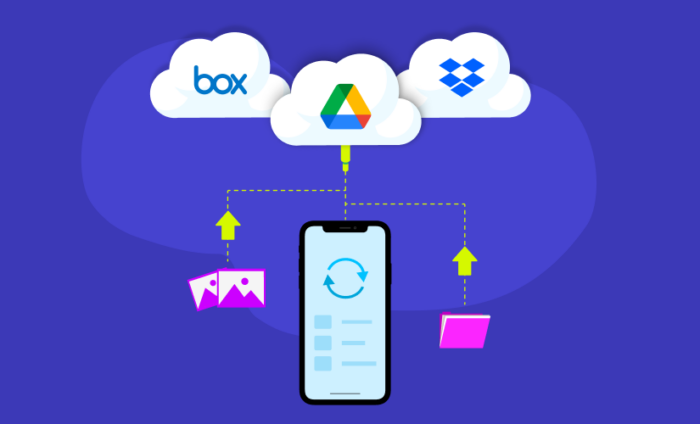This article explains the critical importance of smartphone storage and cloud storage options in managing digital content effectively, enhancing accessibility, and safeguarding data integrity in an increasingly digital and interconnected environment.
In today's digital age smartphones have become integral to our daily lives. They serve as not just communication devices but also as personal hubs for storing, accessing and sharing vast amounts of data. Availability of ample smartphone storage and option to utilize cloud storage services play crucial roles in managing digital content effectively. They ensure seamless access to information and safeguarding valuable data against loss or damage.
Understanding Smartphone Storage
Smartphone storage refers to internal memory capacity that allows users to store various types of data. This includes photos videos, applications documents and personal files. The amount of storage available on a smartphone varies depending on model and configuration. It typically ranges from 32GB to 512GB or more in high-end devices. Adequate smartphone storage capacity is essential for maintaining smooth device performance. It enables multitasking and accommodates increasing size of media files and applications.
Managing Digital Content
Effective management of digital content on smartphones involves organizing files, optimizing storage space, and ensuring quick access to frequently used data. Users can categorize files into folders, delete unnecessary items, and transfer large files to external storage devices or cloud storage solutions to free up space. Managing digital content efficiently not only enhances device performance but also simplifies data retrieval and minimizes the risk of storage-related issues, such as slow processing speeds or storage capacity limits.
The Role of Cloud Storage
Cloud storage offers an alternative or complementary solution to smartphone storage by allowing users to store data securely on remote servers accessed via the internet. Popular cloud storage services like Google Drive, iCloud, Dropbox, and OneDrive provide users with flexible storage options, scalability, and synchronization across multiple devices. By uploading files to the cloud, users can access their data from any location with internet connectivity, share files with others, and backup important information to prevent data loss in case of device damage or loss.
Benefits of Cloud Storage Options
Cloud storage options offer several advantages over traditional smartphone storage solutions:
- Accessibility and Convenience**: Cloud storage enables seamless access to files from smartphones, tablets, computers, and other connected devices, eliminating the need for physical storage devices or transferring files manually between devices.
- Scalability: Users can expand their storage capacity on-demand by purchasing additional cloud storage space, accommodating growing storage needs without upgrading physical hardware.
- Data Backup and Recovery: Cloud storage providers offer automated backup services that protect data against device failures, theft, or accidental deletion. Users can restore backed-up files easily, ensuring continuity of access to critical information.
- Collaboration and Sharing: Cloud storage facilitates collaboration among users by allowing real-time file sharing, document editing, and version control. Teams can collaborate on projects remotely, share resources, and streamline workflow processes without geographical constraints.
- Security and Data Protection: Cloud storage providers implement robust security measures, such as encryption protocols, authentication mechanisms, and regular data audits, to safeguard user data against unauthorized access and cyber threats.
Optimizing Storage Solutions
To optimize smartphone storage and cloud storage solutions effectively, consider the following best practices:
- Regular Maintenance: Perform regular maintenance tasks, such as deleting redundant files, clearing cache data, and organizing folders to maximize available storage space on smartphones.
- Automated Backups: Enable automated backup settings on cloud storage services to ensure continuous data protection and recovery capabilities in case of unforeseen events.
- Data Encryption: Implement encryption protocols and strong password practices to secure sensitive information stored on smartphones and cloud storage platforms from unauthorized access.
- Selective Syncing: Use selective syncing features available in cloud storage apps to control which files and folders are synchronized across devices, conserving storage space and optimizing performance.
Challenges and Considerations
Despite the benefits of smartphone storage and cloud storage options, several challenges and considerations exist:
- Data Privacy: Concerns about data privacy and compliance with regulatory requirements regarding data storage and transfer may influence users' decisions to adopt cloud storage solutions.
- Internet Dependency: Dependence on internet connectivity for accessing cloud storage services may limit accessibility to data in areas with poor or unreliable network coverage.
- Cost: While many cloud storage providers offer free or tiered storage plans, upgrading to higher storage capacities or additional features may incur subscription fees or recurring costs.
- Integration with Existing Systems: Compatibility issues and integration challenges may arise when integrating cloud storage solutions with existing IT infrastructure or applications used by organizations or businesses.
Future Trends in Storage Technology
Looking ahead, the future of smartphone storage and cloud storage technology is poised for continued innovation and advancement:
- Edge Computing: Edge computing solutions will enable data processing and storage closer to the source of data generation, reducing latency and enhancing real-time data access capabilities.
- Artificial Intelligence: AI-driven storage solutions will optimize data management, predictive analytics, and automated storage tiering based on usage patterns and data insights.
- Blockchain Technology: Blockchain-based storage solutions will enhance data security, transparency, and decentralized storage options, offering enhanced privacy and data ownership control.
Conclusion
Smartphone storage and cloud storage options play pivotal roles in managing digital content, ensuring data accessibility, and safeguarding valuable information in today's interconnected world. By leveraging the capabilities of smartphone storage and cloud storage services effectively, users can optimize storage solutions, enhance productivity, and embrace the benefits of seamless data management across devices. As storage technology continues to evolve, innovations in cloud computing, security protocols, and data analytics will shape the future landscape of digital storage, offering enhanced scalability, security, and flexibility for personal and business use cases alike.
